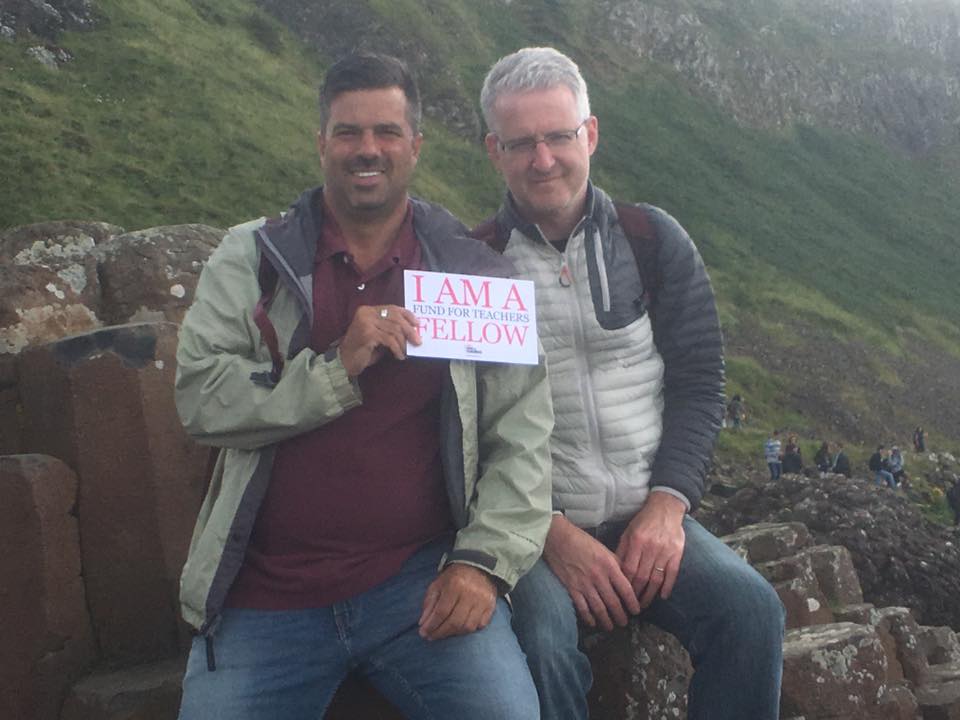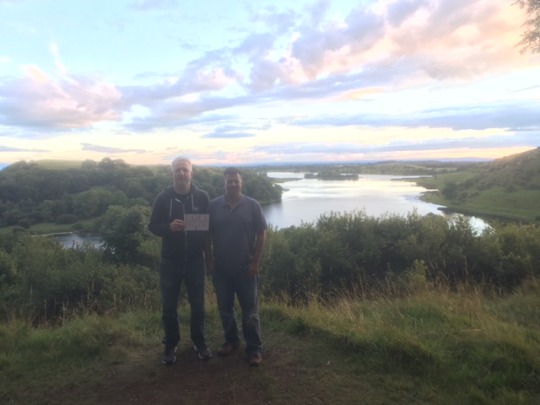Teachers Looking for Troubles

This weekend marks the 48th anniversary of Ireland’s Battle of the Bogside, a riot between Protestants and Catholics that initiated a three-decade conflict known as “The Troubles.” FFT Fellows Saul Fussiner and David Senderoff (New Haven Academy – New Haven, CT) are currently in Ireland researching this period of history and share their experiences below…
We teach a Facing History & Ourselves course for sophomores called “History, Legacy, Judgment and Justice,” which deals with how societies attempt to heal after long periods of conflict. We originally taught this course using the case studies of South Africa and Rwanda, but five years ago, in response to student surveys, we switched our second study to be Northern Ireland. We shaped a unit to include an inquiry activity and some quick background on the history of the Republican/Unionist divide, some lessons on Northern Ireland’s Civil Rights Movement and on Bloody Sunday, some classes on the period of the Troubles (especially 1972-1998) and activities and an assessment based on the Good Friday Agreement and its legacy. After teaching on Northern Ireland for several years now, we wanted to learn more about the background of this crisis–the long history of British colonialism and Irish resistance–that led to this struggle in the first place. And we wanted to see how this struggle is remembered, on both sides, in the lands where it took place.
On our Fund for Teachers fellowship, we are gathering relevant materials across Ireland and Northern Ireland. Along the way, we are gaining awareness and knowledge to help students contextualize the Irish situation (both before and after partition) and demonstrate how people behave in groups.

Our fellowship focuses on museums, tours and arts events that provide a nuanced background on Irish and Northern Irish history. Initially, we intended to research only Dublin and Belfast, but are now expanding to a wider range of places, including Limerick, Galway, Sligo, Derry and County Down. We also are documenting our visit with photography and video showing some of the places we visit; we are especially intent on conducting interviews.
Our ever-expanding agenda has included:
- Glasnevin Cemetery Museum (provides a comprehensive and interactive tour through Irish history)
- the Kilmainham Gaol Museum (contains the history of Ireland’s largest jail from the pre-partition period from
1798 until the Irish Civil War of the 1920’s, including the detainments and sometimes executions of the
leaders of the major Irish rebellions in that period) - the Little Museum of Dublin
- the GPO Museum (documents the 1916 Easter Rising, which was
headquartered at the General Post Office, or GPO) - Derry walls walking
tour - the Apprentice Boys of Derry Museum
- the City of Derry Museum (the largest collection anywhere
regarding Bloody Sunday) - Ulster American park in Omagh
- Mural tours in Belfast and Derry
- Stormont
Parliament in Belfast - the Somme Heritage Center (focused on the legacy of the Irish in World War I), and
- Corrymeela Peace Community in Northern Ireland, where one of our visiting teachers is
a community member.
These activities are the backbone of our fellowship, helping us to build a comprehensive background for our course. By walking in the places where history was lived, one discovers interesting details about it, such as when I visited Alabama and saw with my own eyes how close King’s church was to the Montgomery state house and how close the projects of Selma were to the church where the marches were planned. In addition to everything else, we are spending much of our time in the North with the family of one of the teachers who visited us at our school two years ago, and he is a guide for us during our Belfast excursions.
Why teach about Northern Ireland in an urban school district in Connecticut?
We do so because the Good Friday Agreement represents what author Penn Rhodeen has referred to as the most successful example of a political solution to a major conflict in our time. Through dialogue and compromise, Nationalists and Loyalists were able to bring an end to thirty years of police brutality, bombings, kidnappings, murders, gangsterism and riots to forge a lasting – if precarious – period of peace. The warring factions in America’s own political system have been far less successful at dialogue and compromise, creating our current situation of mistrust of government and political institutions at home.
When we teach the Civil Rights Movement in American History, that teaching rests on an understanding of a long history of America and a feeling for the present day in our country. We are looking to replicate that long view and awareness in our understanding of (and teaching of) the Civil Rights period and Troubles period in Northern Ireland. We want to be able to “read between the lines.” We are both trying to become better historians of this place, and in order to do so, we wanted to experience it first hand, through interviewing of people there, and through studying in some of its most important museums and taking some of its tours and in walking
from here to there, literally, on its streets. The content of our Northern Ireland unit is always growing, and this fellowship will help us to become better resources for our students to understand this complex and confusing history.
There is an inquiry activity that we always do right near the beginning of the Northern Ireland unit, where students try to piece together clues to the puzzling struggles in Northern Ireland. Clippings and photos and statistics and maps and excerpts from interviews are examined and students create questions and inferences. We do a similar activity as they get into the specifics of the Northern Irish Civil Rights movement. Later, a big paper activity guides students through the escalation of violence in the 1970’s that followed Bloody Sunday. These are activities that can be added to and rejuvenated with the interviews and the video and photographs that we bring back.
For background information on The Troubles, the 1981 BBC documentary series directed by Ian Stuttard and compiled of key first-hand historical footage, is a good place to start. We also created this blog we’re maintaining throughout our fellowship to help document our learning throughout this grant and beyond.
Saul teaches History, Civics and Facing History & Ourselves at New Haven Academy. Previously, he was Assistant Professor of Film Studies at Hunter College. He has screenwriting credits on two produced films and regularly performs as a live storyteller with the Institute Library Group and the Story City Troupe. Saul has led workshops for other teachers on storytelling, student social action projects and the Holocaust and was a teacher with March of the Living in Poland in 2012 and 2014.
Dave found his niche in education while searching for a way to inspire people to seek achievements through willingness and determination. His “false starts” in the military and as an extremely amateur musician paved the way for higher learning. Always a New Haven Public School teacher, he has taught middle and high school, focusing on critical analysis and inquiry skills.
(Photograph of Dave and Saul at Lough Gur with their “I’m a Fund for Teachers Fellow” sign)
 Back to Blogs
Back to Blogs